Anthoney Dimos
Before midnight, on November 17, police officer Pavlos Petros found Evangelina Christodoulaki, a college student, from the village of Katerini in Sfakia on the island of Crete, hanging by a belt from a light fixture on the ceiling of the soundproof detention center. It was his first day on the job working the nightshift at the Athens police headquarters, as he shouted to his colleagues in the station to help him. Pavlos tried to lift Evangelina’s lifeless body to alleviate the strain on her neck, though, it was too late — her body already had become cold.
She had threatened during her time in police custody that she was going to kill herself. The officers just laughed, dismissing her as crazy after four of them had violated her womb repeatedly in retribution for her striking one of their colleagues fatally with a stone earlier in the day during a demonstration commemorating a day of darkness in modern Greek history.
When Pavlos’s superior, Ares Dimomedes, arrived upon the scene he couldn’t believe the sight before him. He saw the very belt he had taken off and given to Evangelina in jest, a couple of hours earlier, daring her to use it in the manner she so desperately sought. He never imagined she would have had the temerity to carry out the act, entirely underestimating the legacy of conviction in her blood.
Earlier that morning, Hermes was annoyed when his phone vibrated with the receipt of a text message. He knew it was his lover Raffaella, who had been messaging him relentlessly, while he was at the Benaki Museum of Islamic Art. He had been trying to focus on sketching antiquities, featuring Afghan calligraphy, though she remained obstinate in him coming to her mansion in Kolonaki for a late morning tryst. “Where are you? Why are you ignoring me?” read the latest message from Raffaella.
“Not ignoring – just trying to work,” wrote Hermes, placing his phone on top of a copy of Road to Oxiana by Robert Byron that he was carrying with him.
“Liar! You don’t love me!” she wrote, to which Hermes rolled his eyes and returned his attention to a piece of 15th-century ceramic pottery from Herat.
Hermes and Raffaella had met one evening in late September at an outdoor cinema in Vouliagmeni, during a screening of The Two Faces of January, directed by Hossein Amini, adapted from the novel by Patricia Highsmith. Hermes had just arrived in Greece to pursue his ambition as a painter, after being exiled by his father Alcibiades for seducing his mistress. Raffaella was the heir to a large fortune amassed by her father Joseph Awad, an arms dealer and Lebanese Christian, who had profited handsomely from the tumult across the Mediterranean Sea in Syria.
That evening at the cinema Hermes saw Raffaella sitting with her father Joseph and proceeded to take the seat next to her just as the film began. After intentionally ignoring her during the first half of the movie, Hermes, having cultivated an erotic tension between them, slipped Raffaella a note saying that she reminded him of the character “Justine” from the Alexandrian Quartet by Lawrence Durrell. Just as the characters in the feature found themselves at odds in the Knossos in Crete, she returned the note, when her father wasn’t looking, with her phone number written next to the word “Justine”.
After finishing his sketches at the museum, Hermes texted Raffaella telling her he was on his way. “Take a taxi, so you’ll get here faster,” she wrote, as she read The Story of a New Name by Elena Ferrante that her mother had gifted to her for her birthday. Hermes dismissed the idea, preferring to walk through the ancient labyrinths of the city, whereby he could think as well as absorb the culture and history of millennia. In Plaka, he passed by the Ottoman-influenced Venizelos mansion, which made him consider taking Raffaella to Istanbul for a romantic getaway on the Bosphorus.
Upon reaching Syntagma Square, the mood of the city changed. An overcast gray had engulfed the sun, as police, dressed in black anti-riot gear, lined the sidewalks while young students and other demonstrators assembled to commemorate the student uprising at the Polytechnic University against the Junta that had taken place in 1973. Raffaella sent another text message, asking where he was, which Hermes ignored, following his curiosity to remain and observe the moment.
A simmering tension between the officers and the protesters pervaded the atmosphere. Some of the students consciously mocked the figures shouting in their faces, tempting chance, though none of the service members were even born during the 1970s much less the students. Each of the officers stood firmly entrenched like pillars of granite. Their fingers massaged the triggers of their weapons seemingly ready to unleash at the first transgressive provocation.
As he walked, Hermes made eye contact with both the authority figures and demonstrators. A look searching for someone to blame permeated the eyes of those marching, while fear and resentment appeared on the faces of the officers. Not only were the demonstrators protesting because of past pain, but because of their current plight as well. With the financial crisis, they found their livelihood and aspirations thwarted. Many of the young people at the demonstration resented the lack of economic opportunity. The higher education system elevated them to dream in a grand fashion, but the reality of the impoverished conditions in Greece compelled them to work for meager to no compensation, with little prospect for advancement, or pushed them to leave the country.
Those who chose to stay endured a Kafkaesque existence, whereby they dutifully worked full-time jobs, without receiving a salary or staggered pay at a significant reduction. Chilling stories emerged of impoverished teachers interrupting class to go out and buy milk for their malnourished pupils, who had passed out during lessons, as well as instances of young girls selling themselves for the price of a sandwich.
Among others, trained doctors and engineers were forced to flee for better prospects in Germany. For those who left, the longing and displacement they felt eroded the material benefit experienced in their new existence abroad, while those who chose to remain in Greece were compelled to compromise their dignity and ideals in a shattering manner for the prospect of mere survival. As such, the contemporary landscape of the country became a suffocating leviathan that imprisoned people psychologically and emotionally in an endemic state of desperation and disillusionment that morphed perniciously into misery and scorn.
Evangelina joined the demonstration at Syntagma Square after leaving her apartment in Exarcheia. She was in her final year of studies in ancient literature, writing a thesis on the renderings of Sikander or Alexander the Great in the Shahnameh by Ferdowsi, working from her own translation from the classical Persian into Greek. Her interest in ancient cultures and scholarship began when her uncle Michalis, a priest in the Greek Orthodox church, took her to see a collection of Egyptian-influenced Minoan frescoes in Santorini and Heraklion. Intellectual curiosity aside, Evangelina came from a long line of resistance fighters and survivors of blood feuds in Crete. An ancestor of hers had been skinned alive by the Ottoman viceroy on the island for attempting an assassination. Another of her forefathers had coordinated the ambushing of a neighboring village in Sfakia, which had been scheming to launch a campaign that would expunge the Venetians from Crete, because he didn’t want the village to receive credit for the feat. Another fought alongside the swashbuckling British travel writer Patrick Leigh Fermor against the Nazi occupation of her homeland.
Evangelina recently had received admission to a graduate program in ancient studies at Cambridge in England, though the likelihood of her being able to attend grew increasingly remote. The night before November 17, she had spoken with her father Manolis, who had informed her that he was going to be arrested and imprisoned for unpaid taxes and debts. He told her he was planning to go into hiding indefinitely in the mountains of Sfakia, as he had in the past after using a Cretan dagger to slit the throat of a man from a neighboring village in his sleep for stealing sheep, while the dead man’s family sought vengeance.
As a result of her father’s skulduggery, Evangelina would have to abandon her studies and return to Katerini to help her mother take care of her two younger brothers. “I don’t want to come back to Crete!” said Evangelina to her father. “I want to go to England to study.”
“It’s out of the question!” said Manolis. “There’s no money. How many times do I have to tell you?”
“I can find a way with scholarships, jobs…”
“Stop being so selfish. Your family needs you. This is all your fault!”
“No, Baba, it’s yours!” said Evangelina, seething bitterly.
The family taverna, which Manolis’s father had established with significant success, had experienced a precipitous decline with the financial crisis and the poor management of Evangelina’s father. He had cut his expenses to the bone, even moving in with his wife’s elderly parents. But even that situation was becoming precarious, as his father-in-law’s pension had been slashed by half under the imposed austerity measures.
Having heard of female doctors and students in Greece turning to prostitution to make ends meet, Evangelina herself had been moonlighting as an amateur fille de joie to earn extra resources to help sustain herself and her family. The endeavor, though, was not as easy as she had imagined, for many of the men she engaged with conveyed an antipathy for her and the transactional dynamic between them. In fact, one John had elected to pay her recently with a black eye, rather than euros, which had only cleared up a couple of days earlier. She had been replaying the moment in her mind incessantly over the last couple of weeks — the man calling her a “stupid poutanaki” with disgust before striking her with a closed fist, spitting on her, and stealing all of the money from her purse, leaving her half-naked and unconscious on a dark side street under the Parthenon after midnight.
As Evangelina and a couple of her girlfriends walked with the other demonstrators, she tripped on the cracked pavement, whereby Hermes caught her and helped her to regain her balance. Once she was stable, they smiled at each other with a scent of attraction — she reminded him of a hidden icon of Maria he had seen from a monastery near Damascus. Hermes let her go and returned to watching the protest.
Evangelina, though, reached down to pick-up a piece of rock pavement from the crack. “What are you doing?” said Paritsa, one of Evangelina’s friends.
“Getting protection just in case,” said Evangelina.
“Protection from what?”
“From those pigs,” she said, pointing at the officers.
Meanwhile, Hermes found himself in the middle of the street trying to navigate his way through the crowd to reach the other side, when he felt his phone vibrate with the receipt of a text message. He stopped to check it and it was Raffaella again. “This is all yours, when you get here,” read the caption of a selfie she had taken wearing a piece of black lingerie Hermes had purchased for her. He grinned slyly to himself, and decided to abandon the demonstration.
Yet, as he turned over his left shoulder to view the approaching demonstrators, he caught a glimpse of Evangelina cock her arm back and then release the jagged piece of concrete in the direction of Faedra Diomedes, an officer who momentarily had lifted her protective face shield to communicate more clearly with her superior officer and older brother Ares. It was her first time managing a demonstration, and she was feeling anxious as the tension grew. Her brother had not wanted her in the field that day, much less at all in the police force. He had wanted her to marry their childhood friend Dionysos from their hometown of Kardamyli in the Mani of the Peloponnese, who had left Greece to work as an equities analyst for a hedge fund in London. Faedra, though, had other ideas, wanting to be independent and serve in the police like her older brother and father.
Hermes turned away for a moment, but then heard a fracas, as the other officers went to check on Faedra who had been struck directly on the forehand by the jagged rock from close range. Ares placed his two fingers on her neck, feeling her pulse waning. “Faedra! Faedra! Can you hear me?!” said Ares. But she was unresponsive. Ares could feel her slipping away, and began to apply CPR, imploring the other officers to get a medical response team to her.
Evangelina, incensed with frustration, anger, and humiliation, ran to where Faedra lay and began shouting profanities at her lifeless body. The surrounding officers handcuffed and arrested her, while Ares held his dying sister in his arms. The other protesters, not knowing the full context of the events, began to shout abuses at the police. They interpreted her arrest as another case of unwarranted brutality and hardship that had haunted Greece for much of its modern history. Paritsa and the incensed crowd began to cry and shout in outrage for Evangelina who the officers forcefully escorted from the scene.
Hermes watched in a frozen trance as a loud pop rang out from the other side of the street. Though it sounded like a pistol shot, it was only a firecracker ignited by a callow student. The outburst, however, incited instantly a violent melee between the demonstrators and officers. The police utilized night sticks and tear gas to quell the crowd. Hermes, caught in the middle, lost his sense of direction, and his vision became impaired by the gas.
In an effort to regain his balance and orientation, he reached out to grab the shoulder of a person dressed in black who happened to be an officer. When the officer felt the touch from Hermes, he quickly drew his baton and struck Hermes across the head, knocking him unconscious onto the street pavement. While on the ground, the panicked crowed of people stepped on and tripped over him in their effort to escape. Hermes was trapped face down on the pavement with a gash across his right temple and blood dripping from his mouth.
Tears began to stream from the eyes of Ares when he told his mother Chrysoula over FaceTime from the police station that Faedra had succumbed to her injury. Chrysoula had been calling the station and Ares throughout the day, having seen the news of what had transpired in Athens. She had not heard from Faedra as she typically would during the day and sensed the worst.
Somewhat to the surprise of Ares, his mother had remained composed in a manner that he found disquieting. She simply told him, “You know what you have to do,” disconnecting from the call. No stranger to vendettas in the Mani, Ares understood her, but was unsure if he could execute what his mother was suggesting.
Ares entered the back room detention center with three other male officers where Evangelina was being held. The four men said nothing, as Ares began to unfasten his trousers and the other three officers moved to restrain her. Evangelina began to shriek in defiance, shouting for help, but no one could hear her pleas from inside the soundproof room. As each man ravaged her, she wailed with a helpless sound of fury, tears of agony gushing down her cheeks.
The officers in the room felt they were justified in their treatment of Evangelina, as not only vengeance for killing Faedra, but also for the innumerable instances they had experienced vitriol from enraged citizens who repeatedly sought to act in poor faith and take advantage of liberties out of despair or malevolence. The police, too, became imprisoned by the frustration and despair many in contemporary Greek society endured.
When the officers had finished with Evangelina, Ares sat alone with her in the detention center. She was silent, quivering. “We had to do that to you because of you did to my sister Faedra,” said Ares, lighting a cigarette to help settle his nerves. “Do you understand?” Evangelina said nothing.
“Do you want some water?” he said.
“I want your belt,” said Evangelina.
“My belt? Why?”
“I want to kill myself.”
“Kill yourself?” he said. “Don’t be ridiculous.”
“Let me have my dignity,” she said, “please.”
Ares paused for a moment, struck by her sincerity.
“I know you know how much that means,” said Evangelina.
He looked at her and shook his head in negation, rising from his seat to leave.
“Please!” said Evangelina with shrill desperation. “I can’t bear this any longer. Please.”
Ares felt a sense of compassion for her in that moment that overcame his judgment, and removed his belt, tossing it on the ground in front of her. “See if you can do it,” he said with dismissive condescension.
A short time after Ares had left the room, Evangelina formed a noose that she fastened to the light fixture on the ceiling. Before using her momentum to kick out the chair below her, she blessed herself with the Sign of the Cross three times, as her uncle Michalis had taught her in Sunday school as a girl, hoping in vain that the Angel Gabriel would offer her salvation from her final act of martyrdom.
The touch of a woman’s hand on his left cheek awoke Hermes from his sleep. Initially, he thought it was his deceased mother Diana. As he opened his eyes, a throbbing pain from his head paralyzed his movement. Slowy, he leaned upright and placed his hand over the bandage covering his wounds from the baton strike. He looked around at the Hellenistic Buddha statues from Bactria in the room and then heard Raffaella’s voice: “I didn’t know you were an underground revolutionary in your spare time?”
“How long have I been here?” Hermes asked.
“Only a couple of days,” said Raffaella, giving him a kiss on the mouth. “I missed you.”
“Oh, did you?” said Hermes, feigning coquettish disbelief, seeing a copy of a collection of the poetry of Cavafy translated into Arabic that Raffaella found in Beirut.
“I’ve been reading the poems to you,” she said. “I learned it helps to read to people when they’re unconscious.”
“Thank you, chérie,” he said to her.
“I brought you here from the hospital. The doctor will be coming to check on you later.”
Hermes nodded in gratitude.
“Your father called, too,” said Raffaella. “I hope you don’t mind, but I answered your phone and talked to him.”
“What did he say?”
“He said he loved you.”
“That’s it?”
“That’s it.”
“Did you tell him I was in the hospital?”
“He somehow already knew.”
Hermes nodded knowingly.
“Do you remember what happened at Syntagma on the 17th?” said Raffaella.
“No, just a girl threw a stone.”



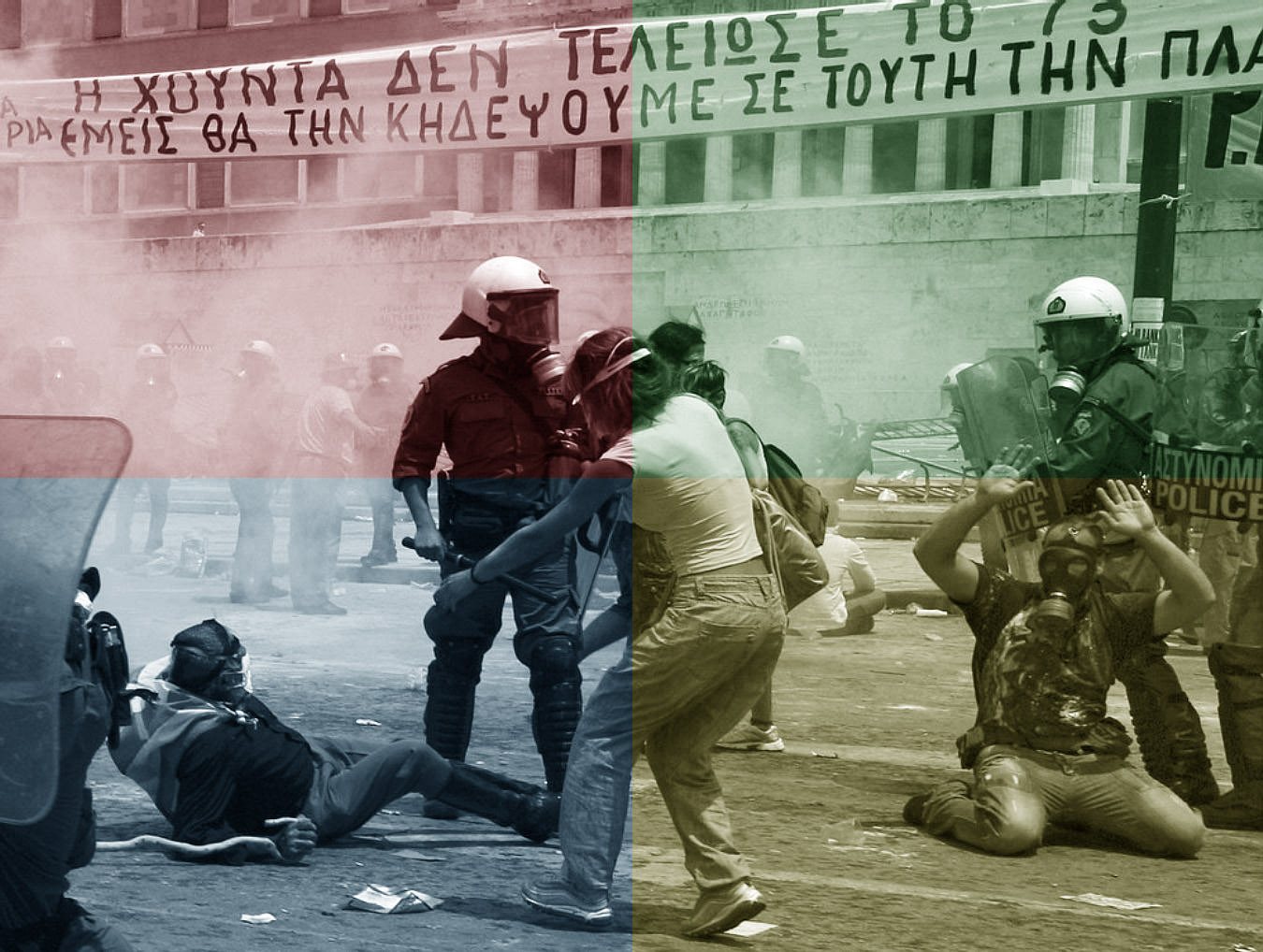

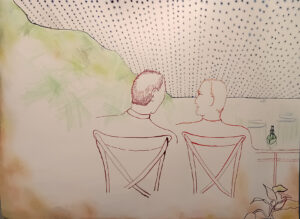
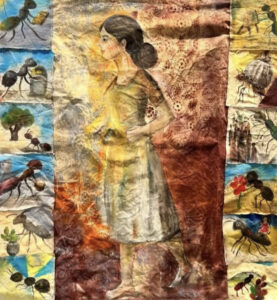


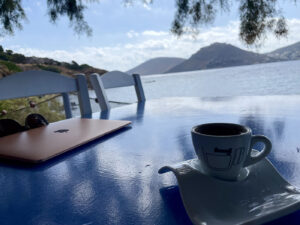


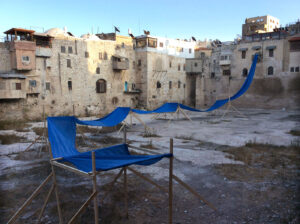

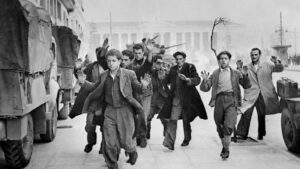



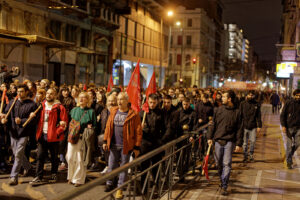







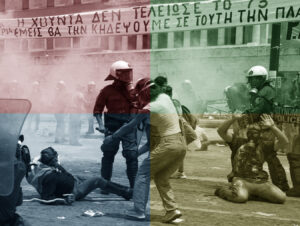





Sorry to bother you.was just looking to see if this was the same Toney Dimos I lost contact with a long time ago.My name is Dohny and I worked in a hotel not far from Syntagma Square(called Festos).I Met Toney who rented an apartment from the owner and even visited him at his parents home near Chicago.If possible,if its the same Toney,I wondered if you could pass my details on to him.my email is martindonaghue1@gmail.com.Efcharisto